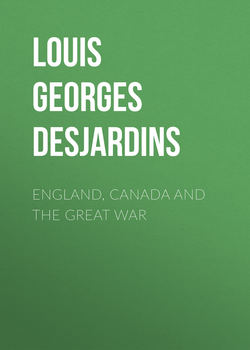Читать книгу England, Canada and the Great War - Louis Georges Desjardins - Страница 12
CHAPTER X.
Had Canada The Right To Help England?
ОглавлениеNot satisfied to do the best it could to persuade our French-Canadian countrymen that they had been coerced into the war by England, our "Nationalist School" extensively used the argument that Canada had not the right to intervene into the European struggle. I refuted this erroneous pretension by the following propositions, the very essence of our constitutional rights and liberties: —
1. – The Canadian Cabinet had the undoubted constitutional right to advise His Excellency the Governor-General to approve the measures to be taken to give effect to their decision to participate in the war, decision and measures for which they were responsible to the Canadian Parliament and to the Canadian Electorate.
2. – The Canadian Parliament had the undoubted constitutional right to approve or disapprove the decision and the measures of the Cabinet. Parliament approved that decision and those measures, acting within their constitutional right.
3. – Even at the time I was writing, it could evidently be affirmed that the Canadian Electorate had approved the stand taken by both the Canadian Cabinet and the Canadian Parliament according to well known and defined constitutional usages.
Was it not proved beyond reasonable controversy, that the Canadian people heartily approved the decision of their Parliament to help in the great war?
Let me summarize the evidence as follows: —
1. – The war policy of the Cabinet, at the special session called in August, 1914, for that very purpose, was unanimously approved by Parliament, no Senator and no Member of the House of Commons moving to censure the responsible ministers for their decision to have Canada to participate in the war. The two great political parties have solemnly sanctioned that decision.
2. – Public opinion was also very strongly proved by the almost unanimity of the public press patriotically supporting the stand taken by Parliament. The exceptions were so few, that, as usual, they contributed to emphasize the soundness of the general rule.
3. – During the three years following the decision of the Canadian Parliament, a great number of large public meetings were held throughout Canada, and addressed by many leading and influential citizens all approving the action of Parliament. The meetings enthusiastically concurred in the powerful indorsation of the war policy of the speakers.
In a few public gatherings some disapproval was expressed, but not one meeting would go to the length of passing "Resolutions" censuring the Cabinet and the Parliament of Canada, or declaring that our Dominion should not have interfered into the war.
4. – Not one petition against the Canadian intervention into the war was addressed to Parliament.
5. – Leading Clergymen, of all denominations; leaders of political associations almost of all shades of opinion; financial, industrial, commercial leaders, all of them approved the patriotic interference of Canada into the war.
6. – The evident general approval of the unanimous decision, taken in 1916, to extend the Parliamentary term.
7. – The wonderful success of the public loans raised for war purposes.
8. – The enlightened and generous patriotism with which the country has accepted and paid war taxation.
9. – But, above all, the voluntary recruiting of four hundred thousand men of all social conditions who have rallied to the flag of the Empire for the defence of her existence and for the triumph of Civilization and Justice.
I, therefore, drew the undeniable conclusion that, contrary to the "Nationalist" pretension, Canada was participating in the war in the most regular constitutional way, without even the shadow of a breach of our Canadian autonomy, of our constitutional rights and liberties.
